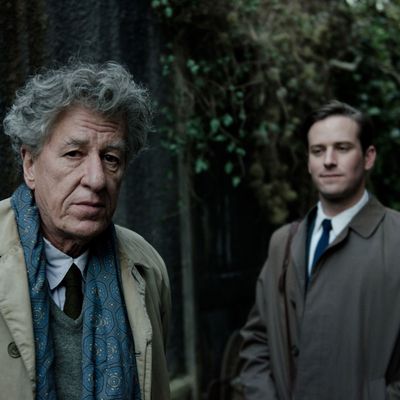
ThereÔÇÖs a willful temperateness to director Stanley TucciÔÇÖs work in Final Portrait, in which the American writer James Lord (Armie Hammer) agrees to spend an afternoon sitting for the painter and sculptor Alberto Giacometti (Geoffrey Rush) ÔÇö and then sits ÔǪ and sits ÔǪ as the days go by while the artist grunts, moans, chain-smokes, and disparages what brushstrokes he manages to make. Lord wrote a memoir about those frustrating weeks in 1964, how heÔÇÖd trudge down the Paris alley to the chaotic studio, how the sessions would be largely silent, interrupted only by visits from GiacomettiÔÇÖs brother (Tony Shalhoub), pained wife (Sylvie Testud), and exuberant prostitute-mistress (Cl├®mence Po├®sy), and by caf├® lunches and dinners in which Giacometti would smoke even more and chugalug red wine.
ItÔÇÖs not the most dramatic setup, and Tucci ÔÇö as IÔÇÖve said ÔÇö de-sensationalizes his story. But his quiet concentration draws you in, so that you slowly understand not just Giacometti (who is, as a human being, impossible) but an art that proceeds only fitfully, gropingly, in a fog cut by flashes of insight that might shortly be dismissed as lies. TucciÔÇÖs palette of blacks and smoky grays makes you feel the effects of light and shadow, and he lets your eyes wander the frame. One of the few close-ups is of GiacomettiÔÇÖs face as he squints toward his subject, at which point Evan LurieÔÇÖs lovely score breaks the silence with a mixture of bowed and plucked strings and an occasional impish xylophone.
A generally flamboyant actor, Tucci settles in behind the camera with what I imagine to be a tiny smile, savoring the step-by-step process of creation from both his characters and his actors. TheyÔÇÖre fun to watch. Under gray hair, Shalhoub speaks in an evenly modulated voice IÔÇÖve never heard from him before. It suits the grounded brother of an increasingly wayward talent. Hammer squirms handsomely and holds himself in: You study his face along with GiacomettiÔÇÖs. Rush is a wonder. It takes bravery to convey closure, tunnel vision, total indifference to the camera that actors always know is there, however self-effacing they might want to be appear. Final Portrait is, like RushÔÇÖs performance, a miniature, but thereÔÇÖs a fullness to TucciÔÇÖs vision transcending every surface.
*This article appears in the March 19, 2018, issue of New York Magazine. Subscribe Now!


